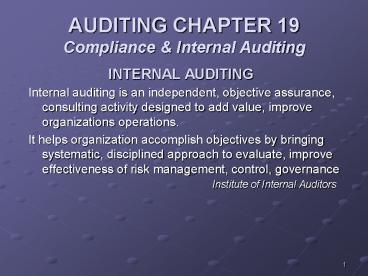INTERNAL AUDITING - PowerPoint PPT Presentation
1 / 9
Title:
INTERNAL AUDITING
Description:
Audit reports prepared by the internal auditors indicate that the system is ... Many internal audit departments report to a level of authority below either the ... – PowerPoint PPT presentation
Number of Views:88
Avg rating:3.0/5.0
Title: INTERNAL AUDITING
1
INTERNAL AUDITING
AUDITING CHAPTER 19Compliance Internal Auditing
- Internal auditing is an independent, objective
assurance, consulting activity designed to add
value, improve organizations operations. - It helps organization accomplish objectives by
bringing systematic, disciplined approach to
evaluate, improve effectiveness of risk
management, control, governance Institute of
Internal Auditors
2
INTERNAL AUDITING Independence, Objectivity
- Independence achieved by reporting to board of
directors - Objectivity achieved by appraising controls, not
designing or implementing them
12. A major responsibility of internal auditing
is to a. Install sound accounting, financial,
and operating controls at reasonable
cost. b. Determine the extent of compliance with
established policies, plans, and
procedures. c. Account for the companys assets
and safeguard them from losses. d. Develop
reliable management data.
14. Taylor Sales Corp. maintains a large
full-time internal audit staff that reports
directly to the chief accountant. Audit reports
prepared by the internal auditors indicate that
the system is functioning as it should and that
the accounting records are reliable. The
independent auditor will probably a. Eliminate
tests of controls. b. Increase the depth of the
assessment of control risk. c. Avoid duplicating
the work performed by the internal audit
staff. d. Place limited reliance on the work
performed by the internal audit staff.
3
INTERNAL AUDITING Independence, Objectivity
11. The independence of an internal auditing
department will most likely be assured if it
reports to the a. President. b.
Controller. c. Treasurer. d. Board of
directors.
- When an independent auditor decides that the work
performed by internal auditors may have a bearing
on the nature, timing, and extent of planned
audit procedures, the independent auditor should
evaluate the objectivity of the internal
auditors. Relative to objectivity, the
independent auditor should - a. Consider the organizational level to which
internal auditors report - b. Review the quality control program in effect
for the internal audit staff - c. Examine the quality of the internal audit
reports - d. Consider the qualifications of the internal
audit staff
4
Case 19-10 An Internal Auditors Objectivity and
Independence
- Many internal audit departments report to a level
of authority below either the board of directors
or the chief executive officer, raising some
doubt about the internal auditors objectivity
and independence. The organization chart on the
following page is an example. - Required Cite the advantages and disadvantages
to the internal audit department of the
responsibilities depicted in the chart.
5
OPERATIONAL AUDITING
- 13. In comparison to the independent auditor, an
internal auditor is more likely to be concerned
with - a. Legal and regulatory compliance.
- Cost accounting procedure
- c. Operational auditing.
- d. Internal control.
- Verification of data
- Appraisal of controls
- Compliance with policies, plans, procedures
- Protection of assets
- Appraisal of performance
- Recommendations for operating improvements
16. Operational audits generally have been
performed by internal auditors but may be
performed by independent accountants. A primary
purpose of an operational audit is to provide a.
Ameans of assuring that internal controls are
functioning as planned. b. Aid to the
independent auditor, who is auditing the
financial statements. c. The results of internal
examinations of financial and accounting matters
to an entitys top-level management. d. A
measure of management performance in meeting
organizational goals.
6
SCIENTIFIC METHOD OPERATIONAL AUDITS
- Scientific Method Operational Audit Function
7
AUDITORS CONSIDERATION INTERNAL AUDIT FUNCTION
- SAS 65, Guidance on
- Considering work of internal auditors
- Using internal auditors to provide direct
assistance - SAS 65 requires independent auditor to review
competence, integrity of internal auditor - Education, experience, certification, continuing
education - Audit policies, programs, procedures
- Practices for assigning internal auditors
- Quality work paper documentation
- Independent auditor can rely on internal auditor
after evaluating his/her work for - Understanding internal control
- Assessing risk
- Performing substantive procedures
8
UNDERSTANDING CONTROLS Internal Auditor
- Auditor should obtain understanding of internal
audit function as part of assessment of control
risk - Organizational status
- Adherence to professional standards
- Internal auditors audit plan
- Access to records limitations on scope of
activities - Charter or mission statement
19. To best understand a companys internal
audit department, the independent auditor
could a. Review standards published by the
Institute of Internal Auditors. b. Make
inquiries of the audit committee of the board of
directors. c. Review reports the internal audit
department has issued. d. Make inquiries of
management.
9
ASSESSING COMPETENCE, OBJECTIVITY Internal
Auditor
17. When an independent auditor relies on the
work of an internal auditor, he or she should
examine the internal auditors work to provide a
basis for judging the a. Qualifications of the
internal auditor. b. Integrity of the internal
auditor. c. Scope of the internal auditors
work. d. Importance of the internal audit
function to the board of directors audit
committee.
18. Independent auditors are unlikely to rely on
internal auditors for a. Assessing risk. b.
Performing substantive procedures. c.
Understanding internal control d. Drafting
audit reports.
20. Internal auditors should be a.
Impartial. b. Advocates for management. c.
Employed by the board of directors. d.
Certified.































